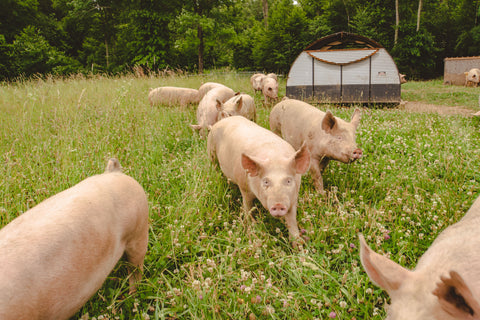Nutritional Benefits of Pasture-Raised Products

You may have noticed that Azuluna Foods products feature our very own pasture-raised eggs, chicken, pork, and lamb – but what really does it mean, and why does it matter? Raising livestock on pasture is a key component of sustainable land stewardship that enhances animal welfare animal and yields more nutrient-dense animal products.

Environmental Impacts:
We practice regenerative agriculture techniques, strategically rotating our animals through the pasture to fertilize and lightly till the land on which we farm. We adapt to the pasture's needs – moving animals from paddock to paddock to graze, allowing pastures to rest, and sequestering carbon from the atmosphere for regrowth. We cultivate healthy and fertile soil and, as a result, grow beautiful pastures for our animals to graze on.

Animal Welfare:
With unrestricted access to this pasture, our animals are raised in an environment with space and natural enrichment that allows them to express their full range of instinctual behaviors. We maintain biodiverse pastures to preserve our local ecosystems and provide our animals with a nutrient-dense forage-fed diet supplemented with GMO-free feed. Our livestock consume grasses, forbs, legumes, seeds, nuts, and small invertebrates, eating a diet that their bodies have naturally evolved to digest.

Nutritional Benefits:
The food your food eats matters. Nutrients are passed up the food chain as they are consumed–from our fertile soil to the lush pasture consumed by our livestock, we pass the pasture-raised benefits along to you!

Eggs:
Studies have shown that laying hens raised on pasture produce eggs with higher levels of fat-soluble vitamins A1, D2, and E1 than that chickens in conventional farming systems. Vitamin A supports vision, cell division, immunity, and reproductive functions. Our body needs Vitamin D to absorb and retain calcium and phosphorous– critical nutrients for bone growth and integrity. And Vitamin E is an antioxidant that helps protect the body from damage caused by free radicals and enhances immune function. Lastly, pasture-raised eggs boast high concentrations of omega-3 fatty acids, a critical component of cell membranes and the building blocks of hormones that regulate blood clotting, artillery wall function, and inflammation. While more microbial research is needed, many studies associate this increase with improved gut health of hens that are allowed to graze on pasture3.
Chicken:
Recent research highlights higher concentrations of alpha-lipoic acids (ALAs)4. ALA’s are antioxidants and aid in the digestion and absorption of food, helping enzymes turn nutrients into energy, like glucose. These increases are attributed to the intake of legumes– such as red and white clover – foraged from a pasture-based diet.

Pigs:
Studies have shown pasture-raised pigs also boast higher levels of PUFAs in intramuscular fat when compared to their conventional counterparts5. Dietary sources of PUFAs may improve blood pressure, serum lipids, and inflammation.

Lambs:
Scientific studies have revealed that lambs raised on pasture provide a higher level of PUFAs, linoleic acid, and vitamin E6. Linoleic acid can work with saturated fats to lower bad cholesterol levels, which can improve insulin resistance and blood pressure!
References:
- Karsten, H. D., Patterson, P. H., Stout, R., & Crews, G. (2010). Vitamins A, E and fatty acid composition of the eggs of caged hens and pastured hens. Renewable Agriculture and Food Systems, 25(1), 45–54.
- Kühn, J., Schutkowski, A., Kluge, H., Hirche, F., & Stangl, G. I. (2014). Free-range farming: a natural alternative to produce vitamin D-enriched eggs. Nutrition , 30(4), 481–484.
- Ricke, S. C., & Rothrock, M. J., Jr. (2020). Gastrointestinal microbiomes of broilers and layer hens in alternative production systems. Poultry Science, 99(2), 660–669.
- Ponte, P. I. P., Prates, J. A. M., Crespo, J. P., Crespo, D. G., Mourão, J. L., Alves, S. P., Bessa, R. J. B., Chaveiro-Soares, M. A., Gama, L. T., Ferreira, L. M. A., & Fontes, C. M. G. A. (2008). Restricting the intake of a cereal-based feed in free-range-pastured poultry: effects on performance and meat quality. Poultry Science, 87(10), 2032–2042.
- Nilzén, V., Babol, J., Dutta, P. C., Lundeheim, N., Enfält, A. C., & Lundström, K. (2001). Free range rearing of pigs with access to pasture grazing - effect on fatty acid composition and lipid oxidation products. Meat Science, 58(3), 267–275.
- Gruffat, D., Durand, D., Rivaroli, D., do Prado, I. N., & Prache, S. (2020). Comparison of muscle fatty acid composition and lipid stability in lambs stall-fed or pasture-fed alfalfa with or without sainfoin pellet supplementation. Animal: An International Journal of Animal Bioscience, 14(5), 1093–1101.




